Documentation
Applications
Last updated on 22. 4. 2020 by Mark Fric
Random groups
Page contents
What are random groups?
Random groups allow to specify the group of blocks that should be used when generating a strategy.
Understanding Random groups requires understanding Strategy templates first. Please check this article first if you don’t know what strategy templates are.
Your choice of Building blocks in StrategyQuant is global – it means that it is used for all the entry & exit conditions.
What if you want to specify more exactly the selection of blocks to choose from for every RandomCondition placeholder?
This is where Random groups come to play. When you click on RandomCondition in the strategy template in AlgoWizard it will open its configuration:
You can see that by default no random group is chosen. This means that StrategyQuant should generate conditions from the global building blocks selection.
It is possible to customize it and you can tell SQ X to generate conditions only from your own pre-defined group. Before we do that we have to create some groups.
How to create and manage Random block groups?
You can do it in a special Customize screen in AlgoWizard. Click on Customize icon on the top toolbar:
This will put you to a Random block groups editor where you can create and modify your own random groups:
By default StrategyQuant doesn’t have any random groups defined, it is up to you to create some groups if you want to use them.
It is simple – click on Add group and fill group name and type.
The type determines what kind of blocks the group can contain and where it can be used:
- Conditions – group can be used in RandomCondition placeholder, for creating conditions for trading signals
- Values – group can be used in RandomValue placeholder for creating price or numeric values – for example for Stop/Limit entry price
- Actions – group can be used in RandomAction placeholder for creating entry order and other actions.
We have created a new group Group 1, but it is currently empty:
To be able to use it we must add some blocks to this group. You can use Add block button or Copy & Paste some existing blocks from AlgoWizard editor. Choosing blocks works in the same way as in editor:
Just find and choose your signals or combine indicators, price values and comparisons to create your set of conditions.
We can create a group like this:
Our Group 1 contains only 4 possible conditions – two for Aroon and two for StdDev indicator.
Don’t forget to click on Save to save this group.
Using Random groups in strategy template
Now we can go back to our strategy template. We’ll add one more Random condition that will use the newly created group. Click on Add another condition:
And then find Random condition and configure it like this:
We’ll name it RandomFromGroup1 and we’ll choose Group 1 for a Random group.
If you did it right it should look like in the image below:
We didn’t need to create a new RandomCondition – we could have just edit the existing one, but this si only an example. With the current configuration we have two RandomCondition placeholders that will be generated randomly in StrategyQuant:
- RandomCondition(RandomConditionLong) – has no group specified, so it will be generated from blocks configured in Full settings -> Building blocks. Moreover, it could use and/or operators and can contain more than just one condition – depending on your setting in Full settings -> What to build -> # of Conditions, Periods
- RandomCondition(RandomFromGroup1) – uses Group 1, so it will be generated from our newly defined group. SQ will choose randomly only from these 4 blocks:
- Aroon(14).Up crosses above Aroon Down
- Aroon(14).Down crosses below Aroon Up
- StdDev(14) changes direction downwards
- StdDev(14) changes direction upwards
These blocks don’t need to be selected in Full settings -> Building blocks, and only one condition will be generated.
We want Short entry signal symmetrical to Long entry so we should add also one NegatedCondition there, so the resulting template will look like this:
When we’ll use this template for strategy generation in SQ X it will generate the conditions for entry signals
Parameters generation in random groups
If you use Random group in your strategy template, its contents takes precedence over your settings in Building blocks. If the given placeholder should be generated using random group then it will be generated using the blocks in that group – and these blocks DON’T NEED to be selected in Builder settings -> Building blocks.
Moreover – blocks will be generated in a way they are specified in random group. If you use fixed parameter values in your blocks, then only these fixed values will be used.
An example of random group MyGroup:
This group contains two blocks:
- CCI > 0
- RSI is rising
You can see that CCI is defined with a fixed period 18, and RSI uses randomly defined period. This means that when you’ll generate strategies using this group:
- whenever SQ chooses to use CCI > 0 condition, it will always use fixed period 18, so the condition will always be: CCI(18) > 0
- whenever SQ chooses to use RSI is rising condition, it will generate RSI period randomly using your configuration, so it can generate conditions like: RSI(20) is rising, RSI(50) is rising, etc.
Note – always set your parameters in blocks in in Random groups to random if you want them to be generated randomly.
Was this article helpful? The article was useful The article was not useful

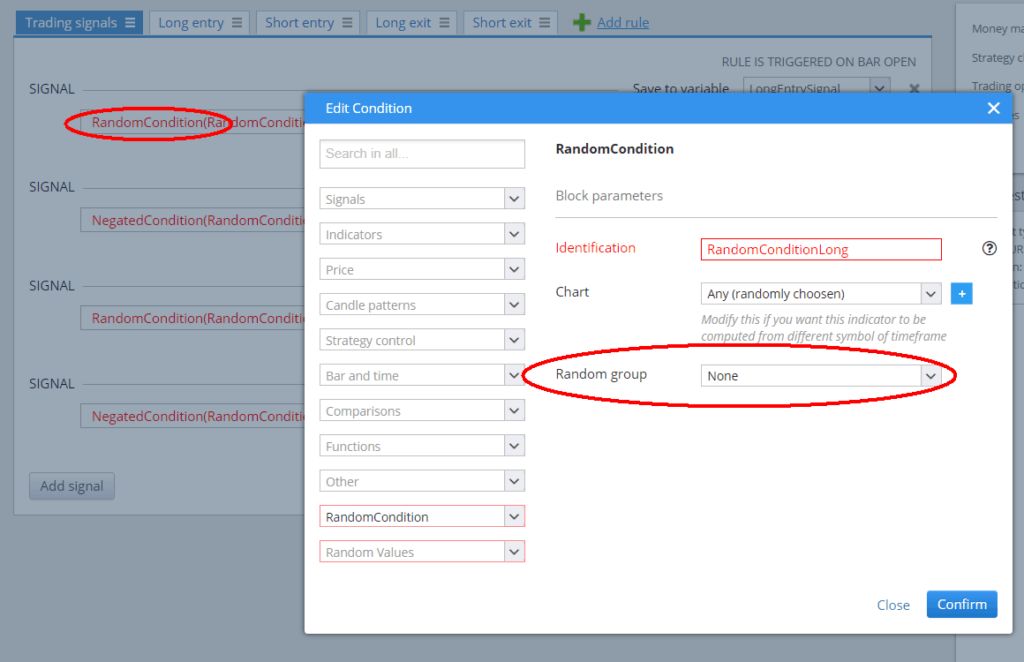

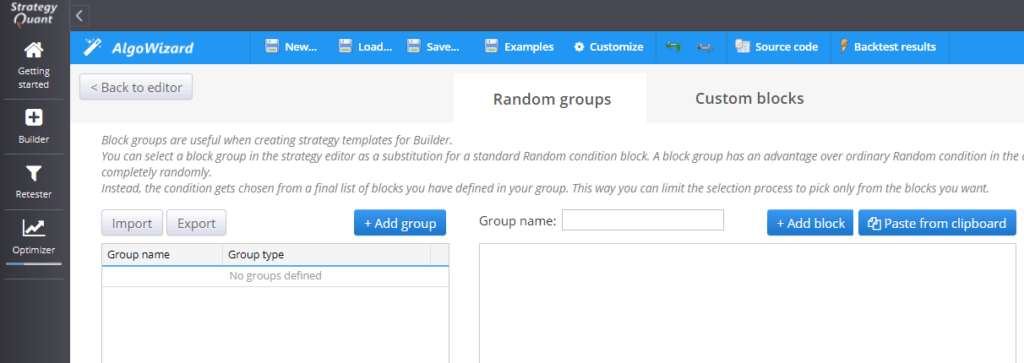


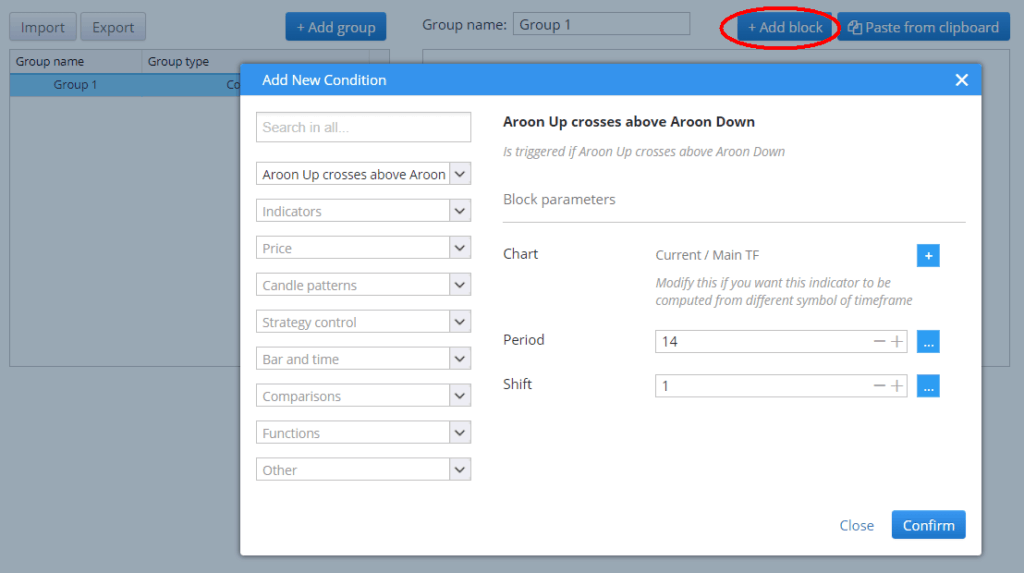
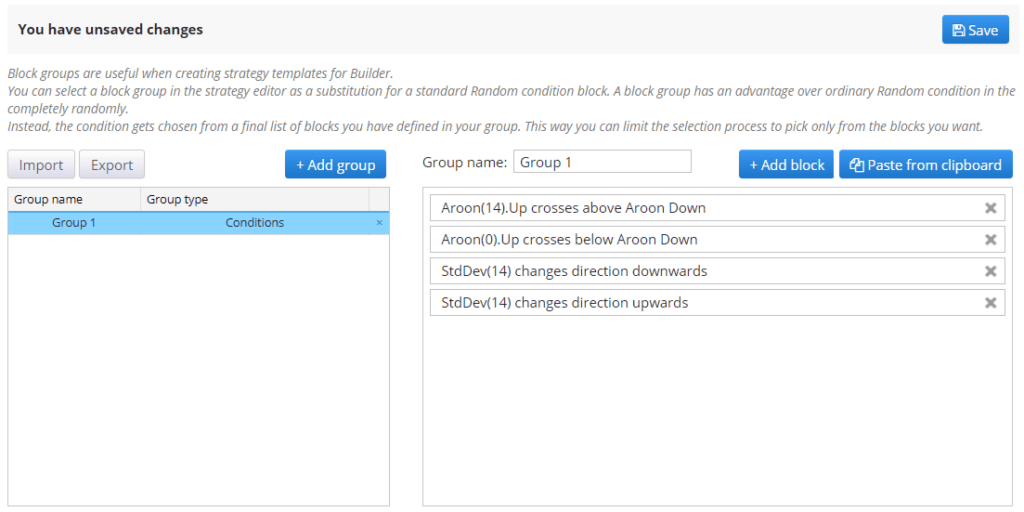


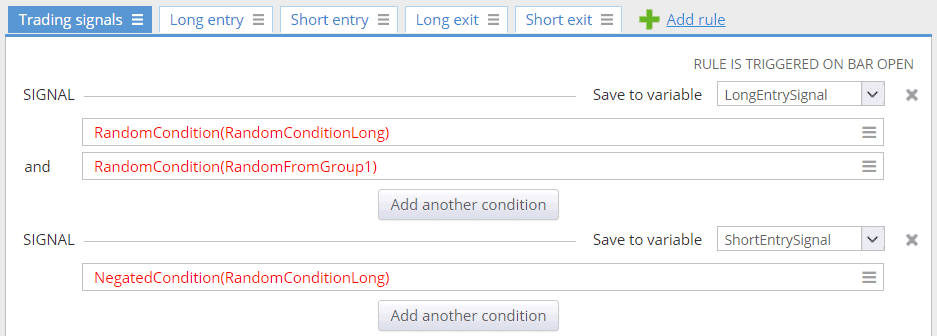
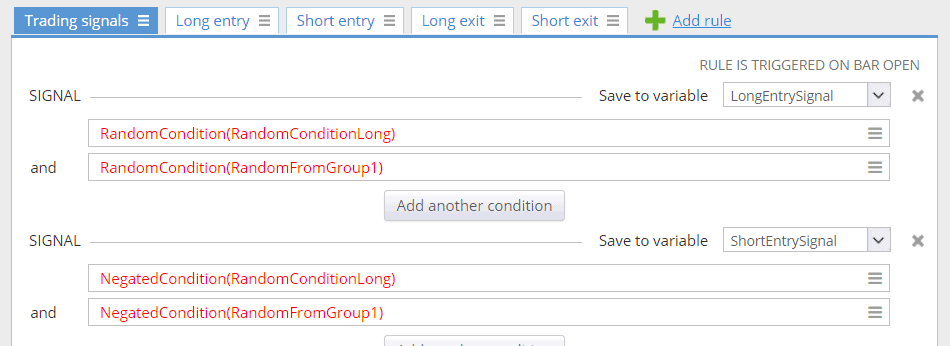
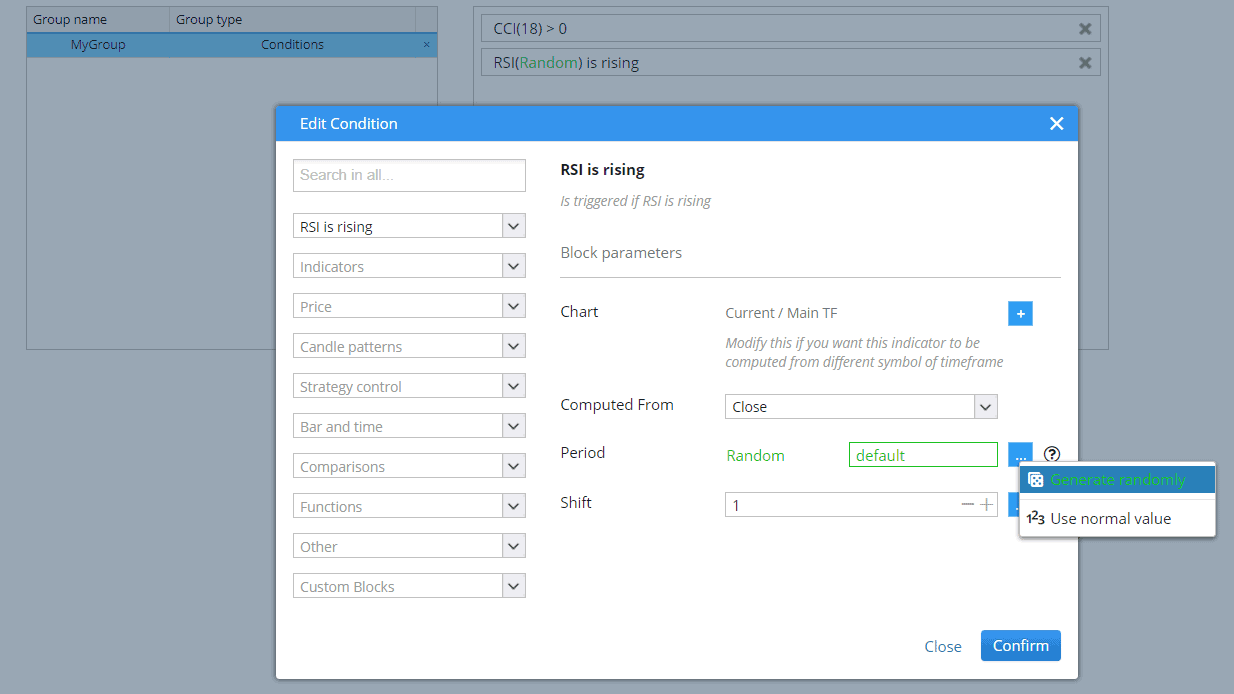
The last picture is missing
Thank you, I have fixed it
This is exactly what I was looking for !!!!!!!!!!!!!!!!!!!
This is excellent !!!!!!!!!!!!!
Thank you to everyone at SQX 🙂
This is really an awesome idea !!!!!!!!!!!!!!!!!!
in Custom Project, do we have a task to load a group of building blocks ?
Can we have more precision on the block format ? What kind of block are accepted ? When I use it , I am getting error . SQX does not run with my blocks. Are any block not compatible ?
the Equals and not Equals block is giving some error